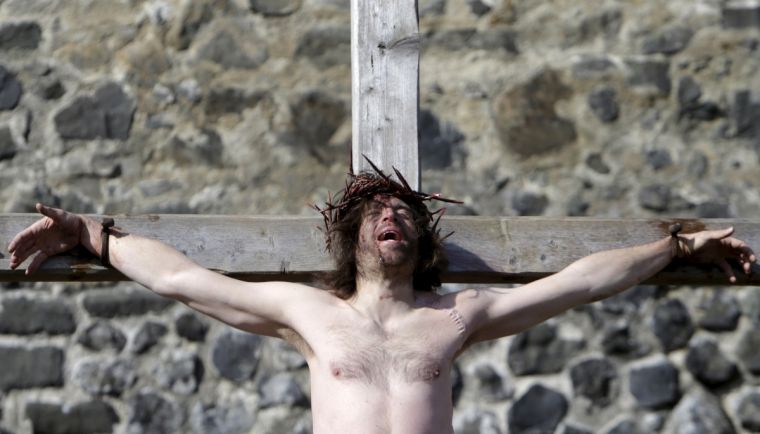The most difficult column I've ever written
I'll admit it: I have struggled with this latest article in our fortnightly series 'The Rough Guide to Discipleship'.
We have got to the segment of Mark's gospel which tells us about the crucifixion of Christ. And the difficulty is this: if you are a Christian, like me, you may well feel fairly familiar with it. Perhaps you go to a church where you regularly say the Apostles' Creed and are well-versed in the timeless words that Christ 'suffered under Pontius Pilate, was crucified, died, and was buried'. Yep, you know that, say that, believe that.

And maybe you have a good grasp of the theology of the cross – that Christ 'died for our sins, according to the Scriptures,' as Paul puts it in 1 Corinthians. You may even be familiar with a visual aid that some Christian teachers use which involves transferring the weight of a heavy book (representing our failures) from one hand (representing us) to the other hand (Jesus), thus demonstrating how Jesus takes our sin upon himself. It's a pretty neat way of explaining it.
But when actually you stop, and slowly read afresh the account of Jesus' crucifixion, well – the whole story starts to defy our neat little summaries (helpful though they may be) and takes on an altogether darker and more shocking hue. Why? Because what we easily forget is this: The. Crucifixion. Is. Horrific. And that is what has hit me as I have written this.
1. The skull. As Mark reaches the climax of his gospel he tells us that 'they brought Jesus to the place called Golgotha (which means the place of a skull),' Mark 15:22. Maybe the shape of the rock formations there looked like a skull – and some in Jerusalem still do today. Or maybe, and perhaps more likely, it was a colloquial nickname for a place of death. For modern equivalence, think how the locals re-named Al-Naim (Paradise) Square in Raqqa, Syria, after the so-called Islamic State started using it for executions. It became known instead as Jahim Square – which means hell.
2. The drugs. Mark tells us that some of those watching the execution 'offered him wine mixed with myrrh, but he did not take it,' (v23). The Talmud – a collection of Jewish writings – tells us that some women from Jerusalem were in the habit of providing this narcotic to those being crucified to dull the pain. Why does Jesus refuse? Former Bishop of Durham Tom Wright suggests that he was choosing 'to drink to the dregs the "cup" that his Father had given him' – the cup of God's justified anger at human wickedness which Christ was bearing.

3. The execution. In the sparest, starkest language, Mark states simply: 'And they crucified him,' (v24). Crucifixion was viewed with such horror in the first century it would not even be mentioned in polite conversation, just as today we would be highly unlikely to discuss the subject of rape at a dinner party. The cross has become an item of jewellery which in and of itself may be rather lovely, no doubt – but how easy therefore for us to forget the horror of what lies behind it.
4. The exploitation. The soldiers executing Jesus divide his clothes up among them, casting lots – perhaps by dice – to decide what item each should get. And somehow, here among the squalor and degradation is just a hint that there is more going on that it might at first seem. For this event echoes the words of Psalm 22:18 where the apparently forsaken servant of the Lord recounts: 'I can count all my bones. They stare and gloat over me; they divide my clothes among themselves, and for my clothing they cast lots.'
That psalm ends by declaring that 'future generations will be told about the Lord, and proclaim his deliverance to a people yet unborn, saying that he has done it'. And how prophetic those words were. Commenting on the implications of Jesus' clothes being shared out in the way they were, JC Ryle, first Bishop of Liverpool, writes: 'And why was this? It was that we, who have no righteousness of our own, might be clothed in the perfect righteousness that Christ has wrought out for us, and not stand naked before God at the last day. It was done that we, who are all defiled with sin, might have a wedding garment, wherein we may sit down by the side of angels and be not ashamed.'
And Jeremy McQuoid declares: 'Behind the blood, shame and mockery, you find a most beautiful Lord who absorbed the world's evil in His own body. That's what makes him King of kings.'
A modern hymn sums it all up so well, and serves as a prayer for us: 'May I never lose the wonder / The wonder of the cross / May I see it like the first time / Standing as a sinner lost / Undone by mercy and left speechless / Watching wide eyed at the cost / May I never lose the wonder / The wonder of the cross.' Amen.
David Baker is a former daily newspaper journalist now working as an Anglican minister in Sussex, England. Find him on Twitter @Baker_David_A
The Rough Guide to Discipleship is a fortnightly series.











